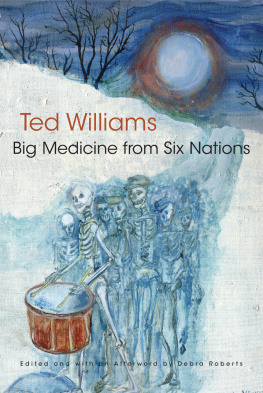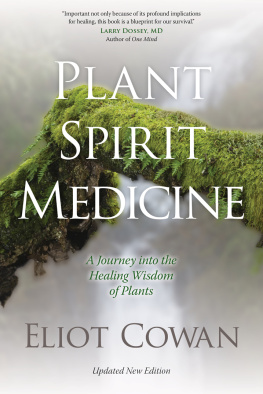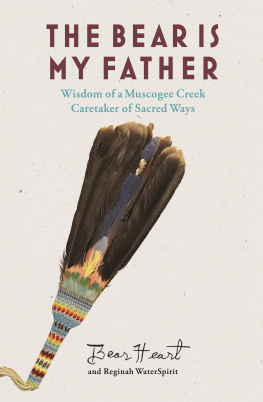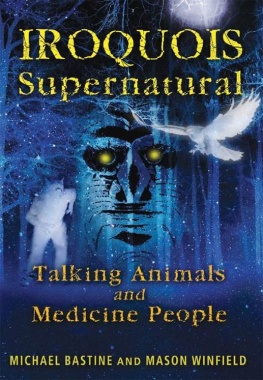Table of Contents
Guide
Page List



Ghost Drummers.
Painting by Diana Osborne Williams.
Used by permission of the artist.

Copyright 2007 by Syracuse University Press
Syracuse, New York 132445290
All Rights Reserved
First Paperback Edition 2017
17 18 19 20 21 22 6 5 4 3 2 1
The paper used in this publication meets the minimum requirements of the American National Standard for Information SciencesPermanence of Paper for Printed Library Materials, ANSI Z39.48-1992.
For a listing of books published and distributed by Syracuse University Press, visit www.SyracuseUniversityPress.syr.edu.
ISBN: 978-0-8156-1094-6 (paperback)
978-0-8156-0863-9 (hardcover)
978-0-8156-5423-0 (e-book)
Library of Congress has cataloged the hardcover edition as follows:
Williams, Ted C., 1930Big medicine from six nations / Ted Williams ; edited and with an afterword by Debra Roberts ; foreword by Christopher Vecsey.1st ed.
p. cm.(Iroquois and their neighbors)
ISBN 978-0-8156-0863-9 (hardcover : alk. paper)
1. Tuscarora IndiansMedicine. 2. Tuscarora IndiansReligion. 3. Tuscarora IndiansRites and ceremonies. 4. Traditional medicineEast (U.S.) 5. ShamanismEast (U.S.) 6. HealingEast (U.S.) 7. Six NationsHistory. I. Title.
E99.T9W55 2007
299.7855092dc22
2007001112
Manufactured in the United States of America

This book is dedicated to the Little People, and to all the False Faces, and to all Benevolent Entities of this and all other galaxies, and to the Periodic Table
Ted Williams was born April 6, 1930, on the Tuscarora Indian Reservation near Niagara Falls, New York. His father, Eleazer Williams, was an Indian doctor and Sachem Chief of the Turtle Clan at Tuscarora. His mother, Amelia Chew Williams, served time as the Clan Mother of the Wolf Clan.
Upon graduation from La Salle High School (1948, Niagara Falls), Ted joined the military and spent four years as a paratrooper in the Eighty-second Airborne during the Korean conflict. He then used G.I. Bill funding to attend the Knapp School of Music in Chicago, playing trumpet and doing small band jazz arrangements.
After marriage in 1954, Ted returned to Niagara Falls and tried his hand as a crane operator at the new large construction project New York State Electric Power Project. The job paid so well that Ted pursued this occupation, transferring his trade to the Eastman Kodak Company in 1966 and retiring there in 1990.
In the 1970s, Ted began doing healings, using herbal remedies, healing-with-hands, and ceremony. The famous seer Daisy Thomas told him that he must join the False Face Society for protection, which led to Teds participation in the traditional Longhouse Way of Life. In 1976, Ted wrote the book The Reservation (Syracuse University Press).
Always active in sports, Ted won many championships in archery, both as an amateur and as a professional. By age seventy-five, he had also won five consecutive pro disc golf world championships in his age group division (seventy and older), called the Legends.
He and his wife, Diana, lived for years in the Pisgah National Forest area of Madison County, North Carolina, in a White Pine home they built with storm-fallen trees. In September 2005, Ted gently passed away into the arms of his beloved Divine and Harmonious Universe.
Contents
, Christopher Vecsey
, Debra Roberts
Illustrations
Foreword
When Arpena Mesrobian handed me The Reservation in 1981, she told me that it was her proudest achievement as director of Syracuse University Press (and hers was a distinguished career). I brought the book home, opened it up, started reading, and the laughter began, then the tears.
Ted Williams touched you like that. This Tuscarora manmember of his mothers Wolf Clan, son of a Turtle Clan Sachem Chief, and an accomplished artist and musicianhad composed an album of love songs to his people and place. They may have had the appearance of an improvised set of droll, sometimes macabre tales, but they were possessed of an aesthetic unity, telling as they did of Teds coming to consciousness of his imperiled Tuscarora culture.
On the pages of this book, the reader got to meet Teds family, his neighbors, and the nonhuman persons who populated the Tuscarora environment. People visited one another and shared stories. They argued, and sometimes they damaged each other and themselves. Death was ever present. Rituals offered opportunities for all manner of interaction, and the outside world provided challenges that shook the foundations of the reservation community.
The Reservation closed with a passage, set in Teds young adulthood, that explained that books genesis (and, it might be said, this ones, too) in the deaths of the culture bearers of his parents generation:
The Tellers were all dead or dying. I didnt feel very good. I wasnt even walking anymore. Right next to me was a young pine tree. It was one of the 4H trees that I had planted. It was almost as tall as I was now. I put my hand on its sappy little trunk.
OoKHREHHweh, I said to the little pine, whos going to be The Tellers now, now that The Tellers are dead?
At first the little tree didnt answer, but I waited. After a while it said, You and I will be The Tellers. Someday children will say, What did the Old Folks say? and they will be asking about USabout what YOU and I are talking about right now.
Ted Williams had become a Tuscarora Teller, and The Reservation was his homegrown tale.
I told my students to read this book in order to learn about American Indian life in the twentieth century. Over the years I have assigned it many times, and they have often told me that they had expected to find a set of Indian stories, but instead were taken by Teds transcending humanity.
They should meet him, then.
And they did, when he came to my class. He told them how he had been breast-fed after his birth for many years, until he started asking his mother for cookies with his milk. That got the students laughing, and they questioned him about his life, his writing, his people, and his beliefs. When they inquired about todays Tuscaroras, Ted replied (and I wrote it down), Beliefs are where its at, and if you believe, you can do anything. Believe in yourself, and only good things can happen. He seemed to be addressing his audience as well as his tribe. Then he added, If the Tuscaroras need something and want it back, it will come back. Here he seemed to be describing his own lifelong project to keep alive the traditional wisdom of his people. He told the class about his enduring quest for spiritual knowledge, his search for Higher Consciousness, his desire to learn all he could about Medicine in all its forms.
It did not surprise me, when the class was over, that several students sought Ted out privately for advice and guidance.













